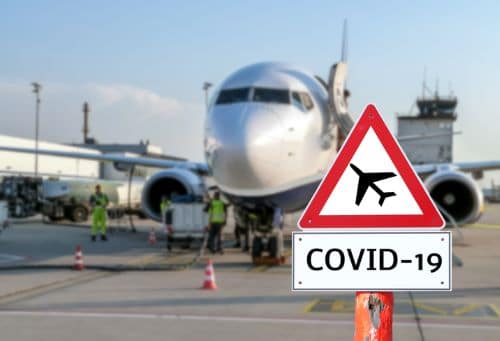A packed plane seems like the last place you’d want to be during the pandemic.
Distancing is impossible. It’s difficult to avoid high-touch surfaces like tray tables and seat arms that could harbor the coronavirus. And although the cabin air is filtered, how much virus is floating around is anybody’s guess.
That’s why the events of March 9 seem like a recipe for disaster.
Seven people infected with coronavirus got on a plane. They didn’t know they had the disease. This was before safety protocols were established, so none of them wore masks.
There were 95 other passengers on the plane. None of them wore masks, either. The flight from Tel Aviv, Israel, to Frankfurt, Germany, lasted four hours and 40 minutes.
German researchers analyzed what happened. What they found might surprise you.
Only two of the non-infected passengers came down with COVID-19 after the flight. They were both seated within two rows of one of the coronavirus carriers. The researchers say it’s possible that no one caught the disease on the flight. That’s because the two who tested positive could have contracted the coronavirus somewhere other than the plane.[1]
Plane Travel Is Less Dangerous Than You Think
The study shows that the coronavirus may not spread easily aboard planes. Besides wearing a mask, here are steps you can take to minimize your exposure while flying:
- Don’t close your overhead vent. Dr. Mark Gendreau has extensively studied how infectious organisms spread through airplanes.If you leave the air vent on, it actually helps you avoid viruses and bacteria, he says.[2]
The air coming out of the vent is run through a HEPA filter.
It can remove more than 99% of germs and other contaminants.[3]
What’s more, the overhead vent creates a turbulent zone that helps keep viruses that escape the filtration system from settling in your mouth, nose, and eyes, Dr. Gendreau said.
- Bring sanitizing wipes. As soon as you sit down, use them to disinfect your armrests, tray table, headphones, and other hard surfaces. Also use them on your hands several times during the flight.
- Be extra vigilant in restrooms. Don’t bring purses, cellphones, and other objects into plane restrooms that can pick up germs. Use a paper towel as a barrier when you touch faucets and toilet handles.
On your way out, use a paper towel to open the door.
- Beware of airline pillows and blankets. They are not laundered between flights and can be teeming with germs. Instead, bring your own travel pillow or blanket. Or use your jacket.
- Stay hydrated. Your immune system doesn’t work well when you’re dehydrated. During flights, drink one to two cups of water per hour. Skip alcoholic beverages, which can promote dehydration.
Many of us have chosen not to fly during the pandemic. If you do travel by plane, make sure you take the commonsense precautions above to stay safe.
Editor’s Note: Discover the single best supplement for stronger immunity… The fruit extract that helps 93% of people with respiratory viruses get better in just two days… The germ hotspot that most of us forget to sanitize. Find all this and more in Independent Healing’s Coronavirus Pandemic Guide. Go HERE.
Related Articles
Study Shows Docs Give 71% of Coronavirus Patients Useless Antibiotics
Coronavirus: The Heart Effects Are Scary
Why More Coronavirus ICU Patients Are Making It Out Alive
Like this Article? Forward this article here or Share on Facebook.
[1]https://consumer.healthday.com/infectious-disease-information-21/coronavirus-1008/coronavirus-on-a-plane-one-flight-s-history-outlines-the-risk-760493.html
[2]http://www.travelandleisure.com/travel-tips/turning-ac-on-during-flight
[3]http://www.travelandleisure.com/travel-tips/turning-ac-on-during-flight

